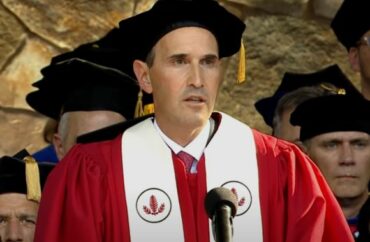
OPINION: Stanford University’s new President Jonathan Levin took an important step in promoting open and free debate on campus
Advocates for actual open debate on college campuses notched a victory recently when Stanford University President Jonathan Levin spoke alongside canceled COVID contrarians.
The panel actually promoted debate by showcasing the contrarians alongside President Levin (pictured), signaling that even if he did not agree with all their ideas, he did not want them canceled for expressing them.
This is more valuable than meaningless “institutional neutrality” statements by places like Syracuse University, which quickly evaporated several days later when the school posted in support of LGBT “Pride” month.
The Freeman Spogli Institute hosted the panel last Friday with Dr. Scott Atlas and Dr. Jay Bhattacharya.
The Stanford University faculty senate opposes academic freedom, so it voted to condemn Dr. Atlas in 2020 for opposing widespread lockdowns and other authoritative COVID rules.
The panel also included other experts who correctly opposed widespread lockdowns, including University of California San Francisco Professor Monica Gandhi and Johns Hopkins University Professor Marty Makary. Both are medical doctors.
“We have many issues today at Stanford, and on other campuses, where views are divided, and in some cases, like this one, where feelings are raw,” Levin said at the event, as reported by The Stanford Daily. “Yet I believe we need to make every effort to get people who disagree, even sharply, in dialogue with one another.”
He noted speakers with different views ended up not attending, which he called “disappointing.”
The event is a great start to what can be a successful tenure as president.
Levin can go further by shutting down attempts to squelch speech on campus. For example, he should permanently shut down the ongoing effort to restrict faculty research that is funded by oil and gas companies.
He should also hold more events with canceled professors who challenged the leftist echo chamber on gender ideology, abortion, and DEI.
In no case does he need to say he agrees or disagrees with any particular view – rather, he is trying to facilitate discussion and ensure students and faculty can hear from a variety of perspectives.
This is, after all, ostensibly the purpose of a secular university.
MORE: 32% of grad students don’t finish in 6 years, study finds
IMAGE: Stanford University/YouTube
Like The College Fix on Facebook / Follow us on Twitter







Please join the conversation about our stories on Facebook, Twitter, Instagram, Reddit, MeWe, Rumble, Gab, Minds and Gettr.